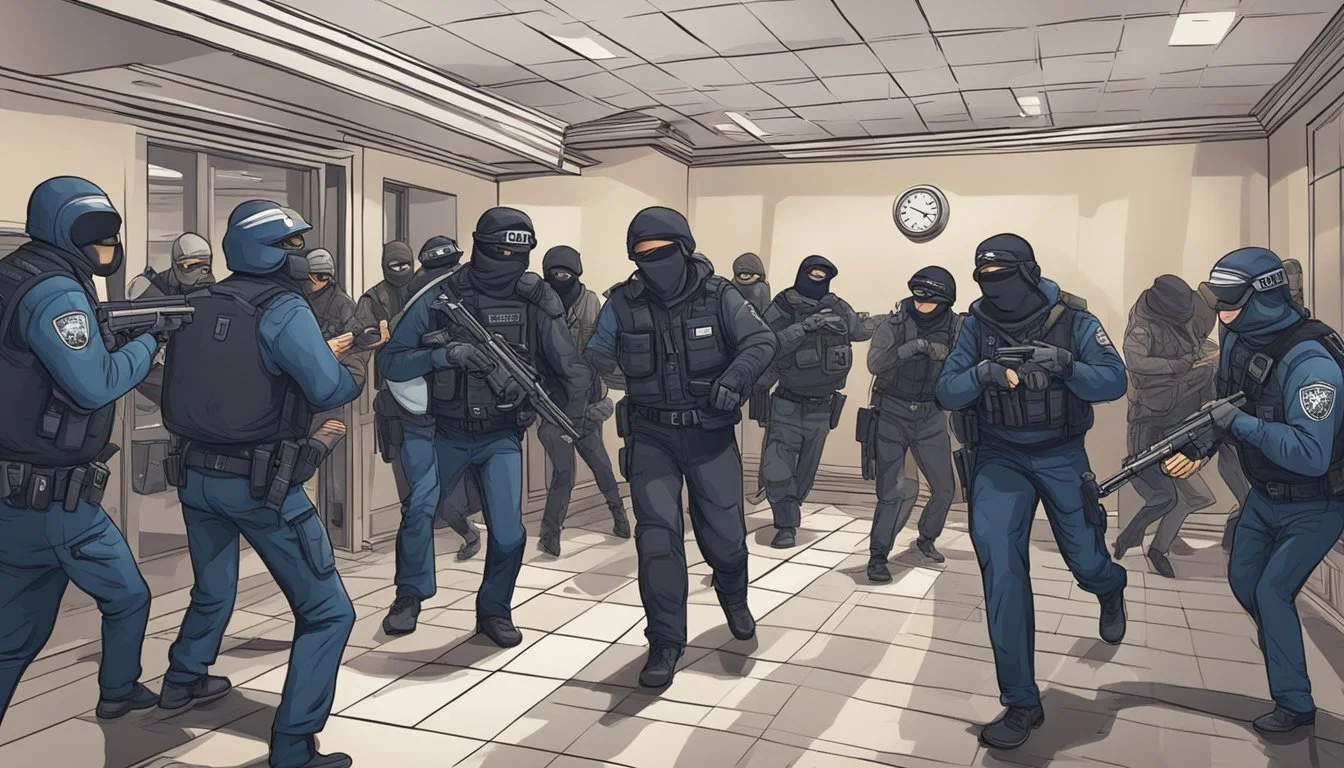Bank Heist Gone Wrong: The True Story of 'Dog Day Afternoon'
A Notorious 1972 Brooklyn Robbery
On August 22, 1972, a bank robbery in Brooklyn, New York, captivated the nation and later inspired the critically acclaimed film "Dog Day Afternoon." John Wojtowicz and two accomplices attempted to rob a Chase Manhattan Bank branch, setting off a chain of events that would become one of the most infamous heists in American history.
The robbery was motivated by Wojtowicz's desire to fund gender reassignment surgery for his partner, Elizabeth Eden. After Eden's suicide attempt, Wojtowicz felt compelled to obtain the money needed for the operation. This unusual motive added a layer of complexity to the crime that captured public attention.
What was intended to be a quick in-and-out job turned into a 14-hour hostage situation. The standoff drew massive media coverage, with crowds gathering to watch the drama unfold live. The botched robbery and its aftermath became a sensation, showcasing themes of love, desperation, and the complexities of human relationships against the backdrop of a high-stakes crime.
Contextualizing 'Dog Day Afternoon'
'Dog Day Afternoon' emerged during a pivotal time in American society. The film reflected shifting attitudes towards LGBTQ+ issues and captured the essence of a turbulent decade.
Cultural Climate of the 1970s
The 1970s saw significant social and political upheaval. The Vietnam War, Watergate scandal, and economic struggles shaped public sentiment. Civil rights movements gained momentum, including those for racial equality and women's liberation.
The Gay Activist Alliance formed in 1969, advocating for LGBTQ+ rights. Their efforts contributed to growing visibility and acceptance of gay and transgender individuals. However, discrimination remained widespread.
Same-sex marriage was not legally recognized anywhere in the U.S. during this period. The concept of gender reassignment surgery was largely unfamiliar to the general public.
Portrayal of LGBTQ+ in Media
LGBTQ+ representation in 1970s media was limited and often stereotypical. Gay characters were typically portrayed as flamboyant or villainous. Transgender individuals rarely appeared on screen.
'Dog Day Afternoon' broke new ground by depicting a sympathetic gay protagonist. The film addressed themes of gender identity and same-sex relationships with unusual depth for its time.
This portrayal challenged prevalent stereotypes and helped humanize LGBTQ+ experiences for mainstream audiences. It came years before the AIDS crisis would dramatically impact perceptions of the gay community.
The Real Story Behind the Film
The true events that inspired "Dog Day Afternoon" centered on John Wojtowicz's desperate attempt to fund his partner's gender confirmation surgery. This section explores Wojtowicz's motivations and the life of Elizabeth Eden, whose identity was central to the unfolding drama.
John Wojtowicz's Motivation
John Wojtowicz, a Vietnam War veteran, robbed a Brooklyn bank on August 22, 1972. His primary goal was to secure money for his partner Elizabeth Eden's gender confirmation surgery.
Wojtowicz was an active member of the Gay Activists Alliance, advocating for LGBTQ+ rights. His complex personal life included a previous marriage to Carmen Bifulco and a relationship with Eden.
The robbery was poorly planned and quickly went awry. Wojtowicz and his accomplice, Salvatore Naturile, held bank employees hostage for 14 hours.
The Life of Liz Eden
Elizabeth Eden, born Ernest Aron, was Wojtowicz's partner and the reason behind the infamous heist. She struggled with her gender identity and had attempted suicide before the robbery.
Eden was not involved in the crime but became a central figure in the media circus that followed. She received her gender confirmation surgery in 1973, paid for by the movie rights to Wojtowicz's story.
After the events, Eden lived a quiet life away from the public eye. She passed away in 1987 due to AIDS-related pneumonia, leaving behind a complex legacy intertwined with one of America's most notorious bank robberies.
The Heist at Chase Manhattan Bank
On August 22, 1972, a daring bank robbery unfolded at a Chase Manhattan branch in Brooklyn, New York. The incident gained notoriety for its unusual circumstances and dramatic 14-hour standoff.
Planning and Execution
John Wojtowicz, using the alias Sonny Wortzik, targeted the Chase Manhattan bank in Gravesend, Brooklyn. He claimed the heist was a well-planned Mafia operation that went awry. Wojtowicz, a former bank teller, likely used his insider knowledge to plan the robbery.
The original team consisted of three men:
John Wojtowicz (Sonny Wortzik)
Salvatore Naturile
Robert Westenberg
Westenberg fled before the robbery began after spotting a police car nearby. This unexpected departure left Wojtowicz and Naturile to carry out the heist alone.
Roles of Sonny Wortzik and Salvatore Naturile
Wojtowicz took the lead role in the robbery, using his experience as a former bank employee. Naturile, the younger accomplice, followed Wojtowicz's lead. The pair held seven bank employees hostage for 14 hours.
Wojtowicz's charismatic personality emerged during the standoff. He managed to gain sympathy from both hostages and onlookers. This unusual dynamic complicated the situation for law enforcement.
Naturile played a more subdued role but remained an active participant throughout the ordeal. The duo's actions and the ensuing media circus turned a failed robbery into a captivating real-life drama.
The Aftermath and Media Explosion
The bank robbery's aftermath sparked intense media coverage and public fascination. Two key aspects shaped the narrative: reporting by the Village Voice and reactions from the gay community.
Village Voice Coverage by Arthur Bell
Arthur Bell, a prominent columnist for the Village Voice, provided in-depth reporting on the robbery. His articles shed light on John Wojtowicz's motives and background. Bell interviewed Wojtowicz's mother and former wife, offering readers a more nuanced understanding of the robber's life.
The Village Voice coverage highlighted Wojtowicz's connection to the gay rights movement. This reporting helped frame the robbery within a broader social context.
Public Reaction and the Gay Community
The robbery became a flashpoint for discussions about LGBTQ+ issues. Many in the gay community initially viewed Wojtowicz as a sympathetic figure, given his stated motive of funding his partner's gender-affirming surgery.
Some activists used the incident to draw attention to discrimination faced by LGBTQ+ individuals. Others worried the robbery would reinforce negative stereotypes.
The media frenzy surrounding the case brought unprecedented visibility to gay and transgender issues. This exposure sparked both support and backlash within the wider public.
Cinematic Representation
Sidney Lumet's 1975 film "Dog Day Afternoon" brought the real-life bank robbery to the big screen. The movie captured the intensity and human drama of the event, earning critical acclaim and multiple Academy Award nominations.
Al Pacino's Portrayal of Sonny Wortzik
Al Pacino delivered a tour de force performance as Sonny Wortzik, the fictionalized version of John Wojtowicz. His portrayal captured the desperation, charisma, and complexity of the character. Pacino's intense acting style brought Sonny to life, showcasing his motivations and inner turmoil.
The actor's nuanced performance earned him an Academy Award nomination for Best Actor. Pacino's Sonny became an iconic character in cinema history, remembered for his passionate "Attica!" chant and emotional phone calls with his lover.
Film's Influence on LGBTQ+ Narratives
"Dog Day Afternoon" broke new ground in its portrayal of LGBTQ+ characters and relationships. The film depicted Sonny's motivation for the robbery - to fund his partner's gender reassignment surgery - with empathy and understanding.
This representation was groundbreaking for its time, offering a sympathetic portrayal of a gay character and transgender issues. The movie helped bring LGBTQ+ stories into mainstream cinema, paving the way for more diverse narratives in film.
Its impact on LGBTQ+ representation in media continues to be recognized and studied decades after its release.
The Legal and Social Outcome
John Wojtowicz's brazen bank heist had far-reaching consequences, both legally and socially. His actions sparked discussions about same-sex relationships and led to significant prison time.
Trials and Sentencing
John Wojtowicz faced swift legal action after the failed robbery. He was tried in federal court and received a 20-year prison sentence. His accomplice, Salvatore Naturile, died during the incident. Wojtowicz served 14 years before being released on parole in 1987.
While in prison, Wojtowicz was involved in a 1976 riot at the Federal Detention Center in West Street, Manhattan. He helped negotiate an end to the uprising, which resulted in his transfer to a different facility.
Impact on Same-Sex Marriage Debate
The robbery and its aftermath brought same-sex relationships into public discourse. Wojtowicz's motive - to fund his partner's gender reassignment surgery - sparked debates about LGBTQ+ rights.
Media coverage of the incident highlighted the challenges faced by same-sex couples. This increased visibility contributed to growing awareness of LGBTQ+ issues in the 1970s.
The story's portrayal in "Dog Day Afternoon" further amplified these discussions. It presented a sympathetic view of a same-sex relationship to mainstream audiences, challenging prevailing attitudes.
FBI's Involvement
The FBI played a crucial role in the unfolding drama of the "Dog Day Afternoon" bank robbery. As the situation escalated, local law enforcement called in federal authorities to assist with the increasingly complex hostage situation.
FBI agents arrived on the scene to coordinate with the NYPD. They set up a command post near the bank and began negotiations with John Wojtowicz and Salvatore Naturile, the two remaining robbers inside.
Throughout the 15-hour standoff, FBI negotiators worked tirelessly to secure the safe release of the hostages. They employed various tactics to build rapport with Wojtowicz and Naturile, aiming to de-escalate tensions and find a peaceful resolution.
The FBI's involvement extended beyond negotiations. They gathered intelligence, assessed potential threats, and prepared for various scenarios. Sharpshooters were positioned strategically around the bank, ready to intervene if necessary.
As the situation reached its climax, the FBI played a pivotal role in orchestrating the final moments of the heist. They arranged for an armored vehicle to transport the robbers and hostages to Kennedy Airport, setting the stage for the dramatic conclusion.
In the end, it was an FBI agent who fired the fatal shot that killed Naturile, bringing the intense standoff to a close. This action allowed for the safe rescue of the remaining hostages and the apprehension of Wojtowicz.
Cultural Legacy and Significance
"Dog Day Afternoon" left an indelible mark on cinema and society. The film's portrayal of a bank heist and its underlying themes resonated deeply, shaping future depictions of similar events and sparking important conversations about LGBTQ+ rights.
Influence on Future Heist Films
"Dog Day Afternoon" revolutionized the heist film genre. Its gritty realism and focus on character development set a new standard for crime dramas. The movie's approach inspired filmmakers to explore the psychological motivations of criminals rather than glorifying their actions.
Many subsequent heist films drew inspiration from its tense hostage negotiations and media circus atmosphere. The film's influence can be seen in works like "Inside Man" and "The Town," which similarly emphasize the human element of criminal acts.
Retrospective View in the Gay Rights Movement
"Dog Day Afternoon" became an unexpected touchstone for the gay rights movement. The film's portrayal of John Wojtowicz's relationship with his transgender partner was groundbreaking for its time.
Gay Activists Alliance members recognized the movie's potential to raise awareness. They used screenings as opportunities to distribute information about LGBTQ+ issues. The film's legacy grew as it became a cultural reference point for discussions about gender identity and sexuality in mainstream media.
In retrospect, "Dog Day Afternoon" is celebrated for its early, nuanced depiction of LGBTQ+ characters in a major Hollywood production. It helped pave the way for more diverse representation in cinema.
Reflections on Criminality and Media
The 1972 Brooklyn bank heist catapulted John Wojtowicz to instant notoriety, sparking intense media coverage and public fascination. This incident raised complex questions about crime, ethics, and society's relationship with sensationalized news.
Media Sensationalism of the Heist
John Wojtowicz's failed bank robbery became a media spectacle. Television crews swarmed the scene, broadcasting live updates throughout the 14-hour standoff. Newspapers plastered Wojtowicz's face across front pages, dubbing him "The Dog" for his unconventional motives.
The press fixated on the robbery's unusual aspects, particularly Wojtowicz's goal of funding his partner's gender reassignment surgery. This angle fueled public intrigue and boosted ratings.
Reporters competed for exclusive interviews and insider information. Some even attempted to contact Wojtowicz during the siege, blurring ethical lines between journalism and interference.
Philosophical and Ethical Questions Raised
The incident prompted debates about criminal justice, media responsibility, and societal values. Was Wojtowicz a desperate romantic or a dangerous felon? Did the intense media coverage glorify crime or serve the public interest?
Ethicists questioned the media's role in potentially escalating the situation. The live broadcasts may have increased pressure on both the robbers and law enforcement.
The case highlighted issues of LGBTQ+ rights and healthcare access. Some viewed Wojtowicz's actions as a misguided attempt to navigate a system that marginalized his partner's needs.
It also sparked discussions about the nature of fame and notoriety in American culture. Wojtowicz's instant celebrity status raised concerns about the potential glamorization of criminal behavior.





